Building a Generation of Leaders: HAF’s Participatory Empowerment Experience
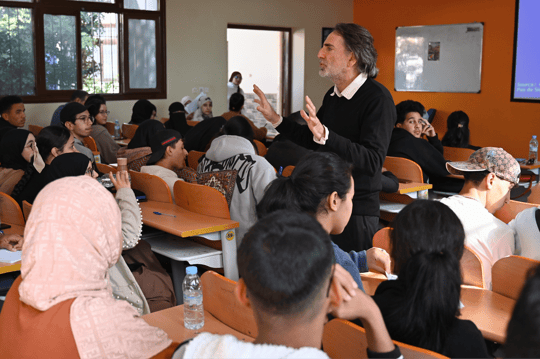
In the discourse of sustainable development, youth are often viewed as a demographic that can benefit from development programs. However, my journey as a facilitator with the High Atlas Foundation (HAF) in community mapping workshops at four Moroccan universities offers a paradigm shift. This experience illuminates the critical role of youth not as passive recipients but as genuine leaders and essential partners in driving sustainable development. This perspective is deeply rooted in the philosophy of Dr. Yossef Ben-Meir, the foundation's president, and mirrors the profound words of activist Ralph Nader: "The function of leadership is to produce more leaders, not more followers."
My personal trajectory, from observer to assistant and then to independent facilitator, was the catalytic spark for my empowerment journey. This transition was a powerful testament to the belief that authentic development isn't achieved through pre-packaged, top-down solutions but through the capacity-building and equitable distribution of roles, particularly among young people. This approach resonates with the principles of Sustainable Development Goal 4 (Quality Education), which underscores the importance of fostering skills that enable individuals to become active agents of change within their communities.
“The function of leadership is to produce more leaders, not more followers.”
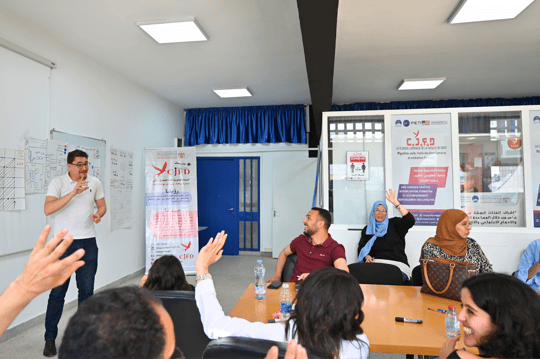
Community Mapping and Evaluating Our Needs Workshop, FSJES Sidi Mohammed Ben Abdellah University - Fez. Photo credit: High Atlas Foundation
Workshop Outcomes: A Participatory Framework for Strategic Planning
The workshops, engaging approximately 567 students, were a living laboratory for this philosophy. The university setting was treated as a microcosm of society where participatory development mechanisms could be effectively applied.
The methodology unfolded as a progressive and integrated process, beginning with a comprehensive diagnostic phase in Agadir. Students collaboratively identified ten diverse priorities, creating a genuine community map of youth aspirations. This initial stage moved beyond a simple list of problems, capturing the richness of their cultural and social backgrounds—from the need for psychological support to creating cultural spaces and establishing student-led volunteer programs.
The second workshop transitioned from need identification to solution-oriented strategic planning. Students were organized into specialized working groups, each tasked with developing practical and contextualized solutions. For instance, the Library group proposed partnerships with national libraries for digitization, while the Internet group advocated for faculty-wide free Wi-Fi. This shift from "what do we want?" to "how do we achieve it?" signified the maturity of the participatory process.
The pinnacle of this approach was the third workshop, which focused on a single priority—the library project—and transformed it into a detailed action plan. This involved forming specialized teams responsible for drafting proposals, securing funding, and liaising with the university administration. This transition from abstract ideas to concrete, executable steps underscores the importance of continuity and follow-up in sustainable development initiatives.
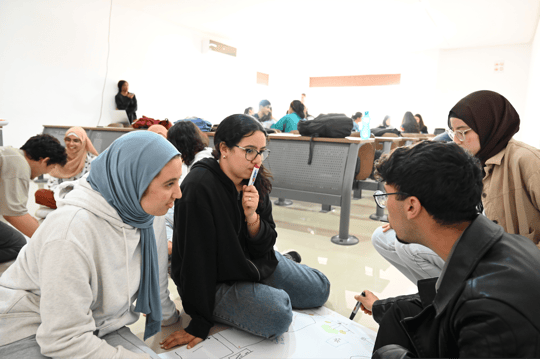
Community Mapping and Evaluating Our Needs Workshop, ENCG Sultan Moulay Slimane University - Beni Mellal. Photo credit: High Atlas Foundation
Comparative Insights: The Synergy of Local and Universal Needs
As I facilitated workshops in Béni Mellal, Oujda, and Fez, a fascinating pattern emerged. While some needs, such as library and health facility improvements, were universally shared, each university had unique priorities that reflected its specific local context.
In Béni Mellal, the pressing issue of power outages highlighted the need for development to be flexible and responsive to immediate local challenges. The emphasis on establishing a cafeteria for healthy and affordable meals also stood out.
In the Law faculties of Oujda and Fez, students prioritized improving governance and communication mechanisms between the administration and the student body. This demonstrated that development is not limited to physical infrastructure but also encompasses institutional capacity-building.
These comparative observations underscore that the participatory methodology is not a rigid formula but a dynamic framework that adapts to the specific needs of each community. This adaptability is key to fulfilling Sustainable Development Goal 17 (Partnerships for the Goals), which advocates for collaborative efforts among diverse stakeholders.
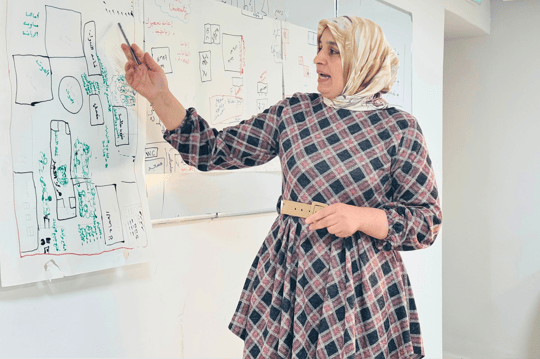
Community Mapping and Evaluating Our Needs Workshop, FSJES Mohammed First University - Oujda. Photo credit: High Atlas Foundation
Conclusion: A Legacy of Leadership for Empowerment
Ultimately, these workshops transcended a mere needs assessment; they served as a platform for building a new generation of leaders. The most profound lesson I gained was the one demonstrated by Dr. Yossef Ben-Meir. By entrusting me with the responsibility of facilitating, he not only bestowed confidence but also taught me that genuine leadership lies in empowering others and providing them with the opportunities to unlock their potential. This is the true essence of sustainable development: cultivating individuals first, for it is they who will build their communities.
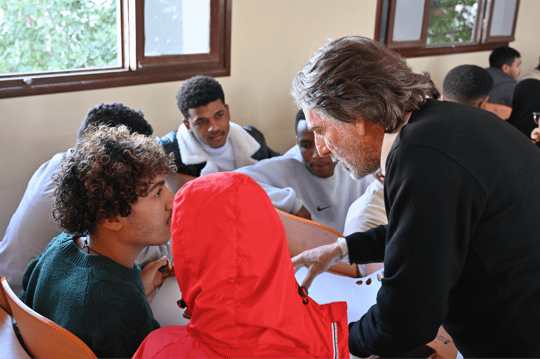
Yossef Ben-Meir at the student community planning workshop, FLSH Ibn Zohr University - Agadir. Photo credit: High Atlas Foundation